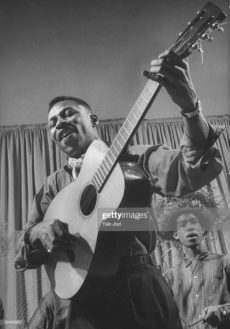
Three Wishes
Johnny Barracuda was asked by Nica what his three wishes would be, he told her:
- “I’d like to have my own club in Mexico City.”
- “That the club’d make enough money so I could sustain my family.”
- “Good health to fulfill the former.”
*Excerpt from Three Wishes: An Intimate Look at Jazz Greats ~ Compiled and Photographed by Pannonica de Koenigswarter
More Posts: baroness,history,instrumental,jazz,music,pannonica,three,vocal,wishes
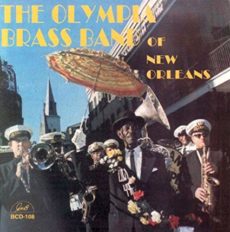
Daily Dose Of Jazz…
Duke Dejan was born Harold Andrew Dejan into a Creole family in New Orleans, Louisiana on February 4, 1909. He took clarinet lessons as a child before switching to the saxophone, and became a professional musician in his teens, joining the Olympia Serenaders and then the Holy Ghost Brass Band. He played regularly in Storyville, at Mahogany Hall, and on Mississippi riverboats.
During World War Two he played in Navy bands. Afterwards, Duke worked in the mail office of the Lykes Brothers Steamship Company for 23 years while maintaining a parallel musical career, leading his own band, Dejan’s Olympia Brass Band, from 1951. The band often appeared at Preservation Hall, recorded nine albums, and also toured internationally, making 30 concert tours of Europe and one of Africa. The band was featured in the James Bond movie Live and Let Die and in many television commercials.
Suffering a stroke in 1991 left him unable to play the saxophone but he continued as a bandleader and singer until shortly before his death on July 5, 2002 at the age of 93. Alto saxophonist and bandleader Harold Dejan best remembered as the leader of the Olympia Brass Band, including during the 1960s and 1970s when it was considered the top band in the city.
More Posts: bandleader,history,instrumental,jazz,music,saxophone
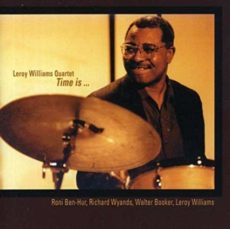
Daily Dose Of Jazz…
Leroy Williams was born in Chicago, Illinois on February 3, 1939 and first began playing drums as a teenager in the 1950s. From 1959 to the middle of the 1960s he played with Judy Roberts, and following this stint he moved to New York City and played with Booker Ervin in 1967.
1968 found him playing with Sonny Rollins, Archie Shepp, and Clifford Jordan; in 1969 he first began playing and collaboration with Barry Harris. 1970 saw him playing with Hank Mobley, Wilbur Ware, and Thelonious Monk, the latter of which he went with on a tour of Japan.
Later in the 1970s he played and recorded with Hank Mobley, Yusef Lateef, Ray Bryant, Charles McPherson, Stan Getz, Andrew Hill, Sonny Stitt, Junior Cook, Al Cohn, Buddy Tate, Ted Dunbar, Slide Hampton, Red Rodney and Bob Wilber, among others.
In the 1980s Williams played with Talk Talk, Level 42, Art Davis, Barry Harris, Tommy Flanagan, Steve Turre, and recorded with Pepper Adams, Bill Hardman. In the 1990s he performed and recorded with Frank Morgan, with Anthony Braxton, Lee Konitz, Ralph Lalama, and Pete Malinverni. Most recently, he was a member of El Mollenium with Roni Ben-Hur, Bertha Hope, and Walter Booker.
He was a member of the cast in the music documentary Bird Now and played one of the Angels of Mercy in the Steve Martin film spoof Leap Of Faith about fake faith healers. At the turn of the decade, Williams was a member of the cooperative band el Mollenium, which also included guitarist Roni Ben-hur, pianist Bertha Hope, and bassist Walter Booker. The band is devoted largely to interpreting the music of the late pianist Elmo Hope. Drummer Leroy Williams continues to be active.
More Posts: bandleader,drums,history,instrumental,jazz,music
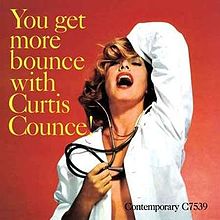
Requisites
You Get More Bounce with Curtis Counce! is a studio album by bassist Curtis Counce recorded on October 8 & 15, 1956, April 27, May 13 and September 3, 1957, at Contemporary Studios in Los Angeles, California and subsequently released on the Contemporary Records label. The music falls somewhere between hard bop and cool jazz and Counce contributed two original compositions to the recording, Complete and Counceltation. The producer for the sessions was Lester Koenig.
Track Listing | 44:39 All compositions by Curtis Counce except as indicated
- Complete ~ 5:51
- How Deep Is the Ocean? (Irving Berlin) ~ 6:35
- Too Close for Comfort (Jerry Bock, Larry Holofcener, George David Weiss) ~ 5:36
- Mean to Me (Fred E. Ahlert, Roy Turk) ~ 4:31
- Stranger in Paradise (Alexander Borodin, George Forrest, Robert Wright) ~ 7:03
- Counceltation ~ 6:01
- Big Foot (Charlie Parker) ~ 9:02
- Curtis Counce ~ bass
- Jack Sheldon ~ trumpet
- Harold Land ~ tenor saxophone
- Carl Perkins ~ piano
- Frank Butler ~ drums
You Get More Bounce With Curtis Counce | by Eddie Carter
Simply stated, this is a superb album by bassist Curtis Counce and his quintet. Counce’s group was one of the better and more resilient bands on the West Coast during the late fifties. As a cohesive unit, the quintet’s interaction throughout the album delivers handsomely on the seven selections that make up this enjoyable set. The album opener is Counce’s Complete which begins with an impressive discussion between the rhythm section ahead of the melody. How Deep Is The Ocean? Is the ageless 1932 standard by Irving Berlin is a perfect vehicle for an affectionate performance by Land who adapts the song as easily as if it was originally created for jazz with a breathtakingly beautiful tenor sax reading of the melody and lead solo, anchored by Sheldon’s imaginative lyricism in support. Too Close For Comfort, the 1956 popular song by Jerry Bock, Larry Holofcener and George Weiss began life on Broadway in the musical production of Mr. Wonderful that year and has been recorded by an A-list of musicians and vocalists too numerous to mention. The 1929 popular song, Mean To Me by Fred Ahlert and Roy Turk has long been praised by critics as a “head of the class” standard for jazz musicians and vocalists to improvise.
Side Two opens with a bop-flavored midtempo rendition of Stranger In Paradise, the popular song from the 1953 musical, Kismet, written by Alexander Borodin, George Forrest, and Robert Wright. Counceltation, the second original by Counce and the title of the 1972 reissue of this album, due in part to the “original cheesecake cover” which enough people found offensive enough for Contemporary Records to replace it with a photo of the artist and his bass in an outdoor setting. The quintet returns to hard-bop on the album’s closer, Big Foot by Charlie Parker which gives everyone a chance to speak their piece on a lively joyride.
If you already own this album you know what to do. If you’re adding it to your collection, place the record on the turntable, drop the stylus, or slide the cd in the drive, crack open your favorite beverage, sit back and settle in to enjoy seven of the best sounding jazz cuts by The Curtis Counce Group that are spontaneous, soulful swinging at its best!
Source: Jazztracks by Eddie Carter | Excerpt: 1/2019 | atlantaaudioclub.org
More Posts: bass,choice,classic,collectible,collector,history,instrumental,jazz,music
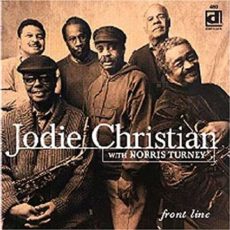
Daily Dose Of Jazz…
Jodie Christian was born on February 2, 1932 on 44th Street and Prairie Avenue in Chicago, Illinois. His grandfather sold his livestock and sent the family there once he realized the futility of raising a family as share-croppers. His mother was a church pianist, who helped him with music. The young Jodie attended Wendell Phillips High in Chicago. When his mother became director of the church choir, he took over on the piano; sometimes they played organ and piano duets in the church. His father sang and played the blues on the piano in speakeasies and rent parties, but ultimately stopped performing and followed his wife into the church.
Christian was one of the founders of the Association for the Advancement of Creative Musicians (AACM) with pianist Muhal Richard Abrams, drummer Steve McCall, and composer Phil Cohran. He and Abrams were also part of the Experimental Band. He worked at the Jazz Showcase club in Chicago and performed with Eddie Harris, Stan Getz, Dexter Gordon, Gene Ammons, Roscoe Mitchell, Buddy Montgomery, and John Klemmer.
He led his own group and recorded six albums, and another fifteen as a sideman with Von Freeman, Eric Alexander, Gene Amons, Lin Halliday, Les McCann, and Ira Sullivan to name a few. Pianist and bandleader Jodie Christian, noted for bebop and free jazz, passed away on February 13, 2012, aged 80, in Chicago.
More Posts: bandleader,history,instrumental,jazz,music,piano




